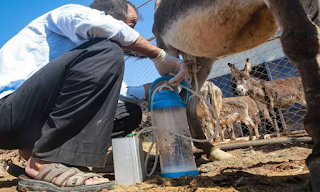AMMAN: Dating back to one year ago, Emad Attiyat, a 32-year-old Jordanian, didn't expect that his donkey milk soap could be sold overse...
AMMAN: Dating back to one year ago, Emad Attiyat, a 32-year-old Jordanian, didn't expect that his donkey milk soap could be sold overseas and attracted growing consumers.
Although some countries around the Mediterranean produce cheese, soap, and other byproducts from donkey milk, it was still a fresh initiative in Jordan. When Amniyat embarked on it, people around him couldn't accept.
"People mocked the idea at that time, rejecting any products made from donkeys," Attiyat said at his farm where he keeps 13 donkeys in the outskirt of Madaba, around 30 kilometers to the capital Amman, during a recent interview with Xinhua.
Without any hesitation, Attiyat insistently carried out his business project named "Atan," which means a female donkey in Arabic language.
"We started the project with three donkeys, so we can produce natural donkey milk soap that is good for skin and hair," Attiyat said, adding that he gave the first batch of donkey milk soaps to his friends and relatives for free.
The encouraging feedback arrived earlier than his expectation when people demanded more of the products and recommended it to others after the trial.
"We are currently receiving orders from the European and Gulf countries through social media," he said, adding that around 4,500 bars of soap are produced each month to meet the demands.
The donkey milk contains rich protein and minerals which are helpful to moisturize skin. In addition, he explained, the customers recognized the organic ingredients and the natural process of making the soap.
Salma Alzubi, a co-founder of the project and Attiyat's mother, demonstrated the soap-making procedure at their workshop in Amman, revealing that olive oil, almond oil, coconut oil as well as shea butter are involved in the mixture of the soap.
As the one who came up with the idea, Alzubi expressed the satisfaction of establishing their bushiness venture, with more job opportunities provided especially amid the COVID-19 pandemic.
Attiyat is currently attempting to expand his donkey milk product line to face cream and body lotion, as well as considering cooperation with e-commerce platforms to reduce the cost of shipping abroad.
One of the key challenges on expanding the business is the donkey shortage in the Arab kingdom, where the animal currently is "on the brink of extinction," he noted.
The number of donkeys in Jordan recorded around 1,000 in 2018 compared with 14,117 donkeys in 1997, according to the Jordanian Agriculture Ministry.
-News Feed














COMMENTS